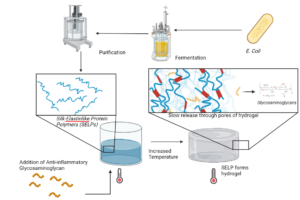Congratulations to Ethan Griswold for receiving The University Graduate Research Fellowship!
My name is Ethan Griswold and I am a Biomedical Engineering Ph.D. student in the Ghandehari lab. Originally from Vermont, I received my B.S. in Biomedical Engineering from the Rochester Institute of Technology, moving out to the U for graduate studies. The University Graduate Research Fellowship is a wonderful opportunity to further my research through provision of funds for the upcoming academic year. I was humbled to be selected as one of the two possible candidates selected from the Biomedical Engineering department, and grateful to be selected as a recipient of the award.
The Ghandehari lab focuses on drug delivery, improving drug efficacy by creating solutions to overcome difficulties with already designed pharmaceutics. An arm of the research focuses on recombinant polymers, such as the silk-elastinlike protein polymers or SELPs which I work with. These polymers are produced through E. Coli instead of traditional chemical synthesis. This allows them to be reliably produced through fermentation of bacteria and to be easily constructed from amino acids. The specific SELPs we utilize are thermoresponsive and form hydrogels, allowing for the polymers to be a liquid at room temperature and a gel through body temperature. Mixing of drugs into these systems is readily achievable, and once introduced into the body, it allows for a slow release of the drug through the pores of the formed hydrogel.

Image made with Biorender.com, adapted from Griswold, E. et. al. (2022). Adv. Drug Deliv. Rev., 191, 114579.
Our primary application for these polymers at the moment is for preventing inflammation from off-target radiation. In some radiotherapies, avoiding exposing other organs to radiation that do not contain cancer cells is not possible. This can lead to a decreased quality of life through unnecessary damage to those organs and may require alterations to their cancer treatment schedules if severe. These types of off-target effects are common in the treatment of pelvic cancers, as external beams of radiation can damage both the bladder and the rectum. However, there are no preventative treatments for the development of this inflammation. To aid in the alleviation of this pain and damage, we are using a modified glycosaminoglycan ethers with strong anti-inflammatory properties and releasing it slowly by administering our drug in SELP at the site, minimizing the inflammation causing the pain patients would experience.
